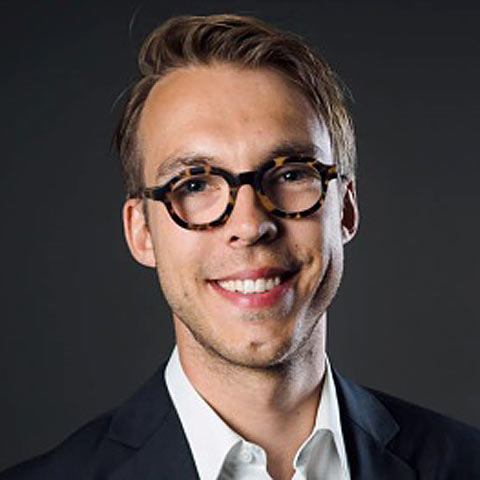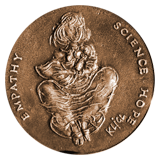Awardees of Egon and Ann Diczfalusy Foundation
Michael FEICHTINGER MD PhD
/ ˈmɪ.çaˌʔeːl ˈfaɪçˈtɪn.gɛr /


YOUNG SCIENTIST AWARD
WINNER IN 2018
- Vienna, Austria
- Medical University of Vienna
resident at the Department of Obs/Gyn
Laudation of Dr. Michael Feichtinger (2018, Budapest)
Laudator: Aleksandra Vejnovic MD - Clinic of Gynecology and Obstetrics, Clinical Center of Vojvodina, Faculty of Medicine, University of Novi Sad, Novi Sad, Serbia
More information on the Downloads section.
The Young Scientist Award is high recognition given to Young Diczfalusy Fellows for their significant scientific activity and commitment to the Foundation. Moreover, this award represents sign of support of intellectual potential of young Diczfalusy member and scientific achievements that he/she will make in the future
I have pleasant task to pay tribute to one such a talent, Dr. Michael Feichtinger.
Dr. Michael Feichtinger was born in Vienna and raised in the suburbs of Vienna, Austria. From an early age he was interested in natural sciences. He finished twelve years of elementary and high school and enrolled human medical studies at the Medical University of Vienna, where he studied for six years. Two month-long internships in hospitals in Umeå, Sweden and Perm, Russia, enriched his clinical experience. Another important experience he gained during a year spent at the Karolinska Institute, Stockholm as an Erasmus student, where he collaborated with Kenny Rodriguez-Wallberg. Michael invested time to learn some organizational skills during one year studying health care management at the Danube University in Krems. He also studied Biology for two years.
In July 2012 he graduated from Medical University of Vienna - Department of Medical Genetics, with thesis: Oct4 expression in amniotic fluid stem cells.
In August 2017 he became PhD on Clinical Endocrinology at the Medical University of Vienna. His thesis was: Novel Treatment Approaches to Enhance Fertility Potential in Infertile Women.
In November same year he finished residency in Obstetrics and Gynecology by passing specialist exam in Jena, Germany. On his own initiative he spread his knowledge and skills attending different courses:
- Masterclass in Vacuum Assisted Delivery; Vacca Research, 2013;
- Statistics for Medical Professionals, Stanford School of Medicine 2015;
- Writing in the Sciences, Stanford School of Medicine 2015;
- Colposcopy diploma AG-CPC 2016;
- Ultrasound Certification ÖGUM1;
- Principles of Fertility Preservation for Reproductive Health Providers Certificate Course, American Society of Reproductive Medicine 2017.
From 2005-2018 he worked as scientific assistant at the Wunschbaby Institut Feichtinger (www.wunschbaby.at) focusing on reproductive medicine, where nowadays he works as a consultant.
Currently he attends post-doctoral studies at the Karolinska Institute, Department of Oncology/Pathology. He is involved in regular teaching activity at the Medical University of Vienna and the University of Applied Sciences in Vienna. Michael is Young Ambassador of ESHRE (European Society of Human Reproduction and Embryology).
Besides, from his students days he is active in science. He participated in several national and international conferences, won scientific research fellowship at the reproductive unit of Karolinska University Hospital in Stockholm in 2016, and regularly publishes scientific papers of which last in January 2018.
His persistence and diligence was also recognized by others when he won different grants and scholarships:
- Visiting scholarship for the European Forum Alpbach in 2009,
- ERASMUS scholarship 2011/12,
- Top-Stipendium of the Niederösterreich Region 2011,
- Scientific Grant of the Mayor of the City of Vienna 2014;
- Young Ambassador of the European Society of Human Reproduction and Endocrinology (ESHRE) 2016;
- Ferring research price at the annual meeting of the Austrian society of reproductive medicine in Eisenstadt, October 2016;
- Veronika Fialka-Moser Diversity Price for Research, November 2017.
However, not only science fills the days of Michael Feichtinger. He enjoys singing, playing trombone and guitar. He speaks German, English, Italian, Swedish and Russian language. His curiosity, creativity and respect for the people and nature makes this year’s winner worthy of Young Scientist Award and this laudation. Congratulations!
Lecture of the Prize-winner (2018)
The future of reproductive medicine - towards minimal invasive techniques and personalized ART
Within the last 40 years, assisted reproductive technologies (ART) have become widely applied worldwide. However, success rates remain relatively low and many aspects of human reproduction are not yet discovered. While various felds in medicine are developing towards a personalized approach, many IVF clinics are still applying a “one size fts all” strategy. Indeed, several adjuvant therapies in ART have been proven inefcient and expensive With the dawn of personalized medicine and more affordable genetic testing, a new frontier opens for reproductive medicine offering a wide range of possibilities. The goal of reproductive medicine physicians should be however, to perform as minimal invasive procedures as possible when dealing with the embryo. Polar body analysis for example may be a feasible technique to rule out maternal age related aneuploidies without affecting embryonic development. Another promising, non-invasive approach to diagnose embryonic viability might be preimplantation genetic testing from culture media as recently described by our group. However, also parental NGS testing might open new treatment strategies and information regarding the underlying cause of infertility. Furthermore, parental carrier screening could identify the risk for monogenetic diseases and allow the selection of healthy embryos. Similarly, in young women, genetic testing could identify the risk for premature ovarian failure and associated conditions and allow for oocyte freezing in young, fertile years. Moreover, through detailed pre-therapeutic parental testing, individualized stimulation approaches might reduce the risk of hyperstimulation and poor ovarian response. Through these technologies, a more targeted and patient-friendly treatment approach could evolve and help patients to start their own desired family.
Curriculum Vitae
Born in Vienna and raised in the suburbs of Vienna, Austria. Early interest in natural sciences and music. 12 years of school, the last 4 years in a high-school with natural science / mathematical focus.
After high school 7 years of human medicine studies, 6 years at the Medical University of Vienna and one year at the Karolinska Institutet in Stockholm as an Erasmus student. Scientific collaboration with Kenny Rodriguez-Wallberg at Karolinska Institutet. During medical studies month-long internships in hospitals in Umeå, Sweden and Perm, Russia. Biology studies from 2008 to 2010 (no degree). Medical diploma thesis on Oct4 expression in amniotic fluid stem cells at the Department of Medical Genetics at the Medical University of Vienna.
Graduation of university in July 2012. Since 2005 scientific assistant at the Wunschbaby Institut Feichtinger (www.wunschbaby.at) with focus on reproductive medicine. From September to December 2012 resident at the same place. From December 2012 until December 2017 resident at the Department of Obstetrics and Gynecology at the Medical University of Vienna. From October 2014 until August 2017, PhD studies on Clinical Endocrinology at the Medical University of Vienna. From October 2016 until June 2017 studies on health care management at the Danube University in Krems. „Young Ambassador“ of ESHRE (European Society of Human Reproduction and Embryology) 2016. Chief-resident at the department of Obstetrics and Gynecology at the Medical University of Vienna from October 2016-April 2017. From May until December 2017 clinical rotation to the gynecological department in Bad Langensalza, Germany. Specialist exam in Obstetrics and Gynecology in November 2017 in Jena, Germany. Since January 2018 consultant at the Wunschbaby Institut Feichtinger. Since January 2018 Post-Doc at the Karolinska Institutet, Department of Oncology/Pathology.
Regular teaching activity for students in their 3rd, 5th and 6th year of medicine at the Medical University of Vienna. Teaching of embryology and pregnancy complications for midwife students at the University of Applied Sciences, Vienna. Scientific research fellowship at the reproductive unit of Karolinska University Hospital in Stockholm from April until July 2016.
Presentations on several national and international conferences.
Languages spoken: German (mother-tongue), English (fluent), Italian (advanced), Swedish (advanced), Russian (basic knowledge)
Grants and Scholarships: Visiting scholarship for the European Forum Alpbach in 2009, ERASMUS scholarship 2011/12, Top-Stipendium of the Niederösterreich Region 2011, Scientific Grant of the Mayor of the City of Vienna 2014; Young Ambassador of the European Society of Human Reproduction and Endocrinology (ESHRE) 2016; Ferring research price at the annual meeting of the Austrian society of reproductive medicine in Eisenstadt, October 2016, Veronika Fialka-Moser Diversity Price for Research, November 2017
Other: Masterclass in Vacuum Assisted Delivery, Vacca Research, 2013; International Russian Language and Culture Courses Certificate (Lomonossow University Moscow); Creativity: Music to my ears, Stanford University online course, 2014; Statistics for Medical Professionals, Stanford School of Medicine 2015; Writing in the Sciences, Stanford School of Medicine 2015; Colposcopy diploma AG-CPC 2016; Ultrasound Certification ÖGUM1; Principles of Fertility Preservation for Reproductive Health Providers Certificate Course – American Society of Reproductive Medicine 2017.
Hobbies: Trombone playing (Jazz, Classical, „Wiener Konzertvereinigung“, „Opernwerkstatt“), Singing, Guitar playing, Nature
Downloads
- Laudation of Michael Feichtinger (2018, Budapest) (PPTX, 15 pages, English, 12.6 MB)